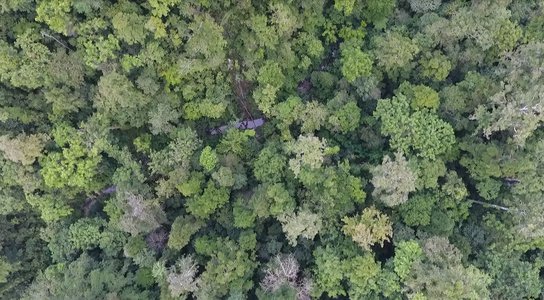The Papua New Guinean (PNG) government has disregarded a decision by its Supreme Court and allowed loggers found guilty of flouting PNG law to continue operating, new research by Global Witness reveals. The revelations come as APEC countries meet in Port Moresby this weekend, February 24-25, to discuss measures to tackle illegal logging and the trade in illegal timber.1 Global Witness is calling on the PNG government, this year’s APEC host, to show leadership on the issue by following through on past commitments to shut down illegal logging operations.
“Hosting the 2018 APEC Summit is a historic moment for PNG, but this risks being overshadowed by land grabbing and deforestation driven by the government’s failure to enforce its own laws,” said Lela Stanley of Global Witness. “The PNG government has been promising for years to crack down on illegal logging but continues to turn a blind eye while its forests are raided by foreign logging interests.”
New Global Witness analysis of satellite imagery and export data reveals loggers have recently extended a major forest clearance operation declared illegal by PNG’s Supreme Court.2 The Court ruled in August 2016 that a land lease used as a pretext to clear forest in East Sepik Province was invalid, and that any associated logging and oil palm development was illegal. It found that the logging operation violated the legal rights of indigenous communities to their land and forests by failing to gain their consent.3
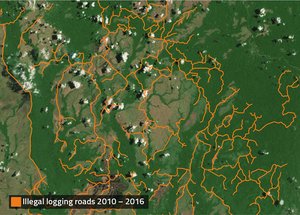
Logging roads built between 2010- 2016 under the illegal SABL
However, the PNG government failed to stop the logging, and in February 2017 its National Forest Board quietly granted a new forest clearance permit to the Malaysian loggers responsible, allowing them to continue cutting down the same forests. Global Witness’ findings show that by the time the new permit was issued around 930 km of logging roads had been built and logs valued at roughly US$65 million exported under the illegal operation. In 2017, more than 70 km of new roads were added and at least US$5 million of timber exported under the new permit.4
“We were elated when the Supreme Court delivered justice to communities that had their land and timber stolen, but our government has taken it away by refusing to stop the logging,” said Augustine Mondu, a community activist in PNG. “People are suffering as the forests and rivers they depend on are destroyed.”
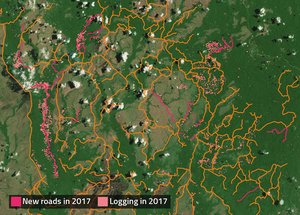
Map showing new logging roads and tree cover loss in 2017
PNG has made headlines
in recent years for the widespread abuse of land leases like the one in East
Sepik, which are known as Special Agriculture and Business Leases (SABLs).
These SABLs have been the main vehicle by which companies have stripped land
from indigenous communities and cleared rainforests illegally. One third of the
wood exports from PNG, the world’s largest exporter of tropical logs, have come
from the leases in recent years.5
Nearly all of PNG’s logs are exported to fellow APEC member countries, with 88% going to China.6 Last year, Global Witness published a report, Stained Trade, linking wood cut in PNG under SABLs to wood flooring made in China and exported to the U.S. The investigation found that companies along the supply chain in China were doing little to nothing to check the legality of wood coming from PNG. This puts U.S. importers and sellers at risk of violating the Lacey Act, a U.S. law prohibiting the sale of wood produced in violation of source country laws. The EU, Australia, South Korea and Japan have also passed laws to curb the trade in illegal timber imports, but China has yet to do so.
“Our investigations following the wood show how the illegal logging crisis in PNG extends beyond its borders. As the destination for most of PNG’s log exports, and the world’s largest timber importer, China has a responsibility to lead on efforts to ensure illegal timber is kept out of international markets. APEC countries should agree a timetable for passing laws to ban the imports of illegal timber. ” Stanley said.
The PNG government included the East Sepik SABL on a cancellation list announced in the local news in early February 2018, but locals say logging has not stopped. Global Witness wrote to PNG’s Prime Minister and the companies involved requesting comment and received no response.
/ ENDS
Contacts
Notes to editor:
1. The APEC Expert Group on Illegal Logging and Associated Trade (EGILAT) was established in 2011 to promote dialogue among member countries on tackling these issues.
2. Global Witness used satellite imagery to map new logging roads in the area since operations began in 2010. Tree cover loss estimates were carried out by Hansen/UMD/Google/USGS/NASA and published by Global Forest Watch.
3. The Supreme Court decision in Lau v Maniwa (SCM No. 19 of 2014) on 31 August 2016 upheld a National Court decision in Maniwa v Malijiwi (OS JR No. 983 of 2011) on 4 July 2014 ruling the SABL issued to Sepik Oil Palm Plantation Limited null and void and any associated logging and oil palm operations illegal. Sepik Oil Palm Plantation Limited, its controlling company Wewak Agriculture Development Limited, and the company contracted to do most of the logging, Summit Agriculture Limited, are controlled by three Malaysian nationals, Chiong Ming Ting, Hui Teck Lau, and Nyi Then, through directorships and shareholdings, according to corporate records from PNG, Malaysia, and the British Virgin Islands. Details available upon request.
4. Based on official export data, logging and exports under the illegal SABL was carried out under Forest Clearance Authority (FCA) 11-01 between March 2010 and January 2017. Wewak Agriculture Development Limited (see note (3)) was granted FCA (11-03) on 6 February 2017 and began exporting logs under this FCA in June 2017. The stated purpose of the FCAs is “large scale conversion of forest to agriculture or other land use development” but satellite imagery shows that forests are being logged but not converted for agriculture, indicating that the FCA is being used fraudulently to gain access to timber. By November 2017, according to official export data obtained by Global Witness, 784,245 m3 of logs had been exported from the operation by Wewak Agricultural Development Limited and Summit Agriculture Limited: 85% under FCA 11-01, 9% under FCA 11-03, and the remaining 6% under six permits purportedly for road construction projects. Only log exports under the FCAs were included in export value calculations, which are based on average exchange rates. Export data for December 2017 was not available at the time of writing.
5. At least 77 SABLs covering 12% of PNG’s landmass, an area larger than Switzerland, had been issued by 2010. The following year an international outcry led the government to establish an official inquiry into their legality. The inquiry concluded that most of the SABLs reviewed had violated laws meant to protect people’s legal rights to their customary land, but the government has failed to cancel illegal leases and halt logging. For more details, see Global Witness (2017), Stained Trade, available at: https://www.globalwitness.org/en/campaigns/forests/stained-trade/
6. The next largest importers of logs from PNG among APEC countries are Vietnam, South Korea, and Japan, which respectively imported 3.9%, 1.7%, and 0.8% of the total in 2017 (through November).
You might also like
-
Report Stained Trade
We followed the 9,000-mile journey of rainforest timber from Papua New Guinea, where illegal logging is rampant, through China to the U.S.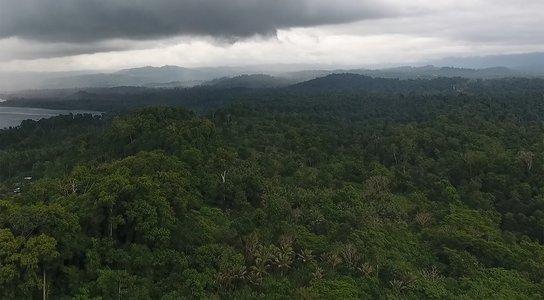
-
Press release China urged to show leadership as world’s largest importer of tropical timber
Carbon emissions from tropical forests threaten Paris Agreement targets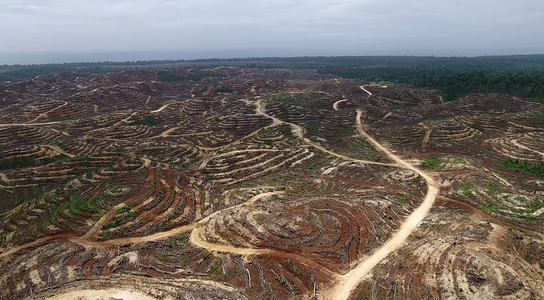
-
Briefing China's high-risk timber trade: Lessons from Papua New Guinea
This brief provides recommendations for carrying out effective checks, known as due diligence, on the Chinese timber supply chain drawing on insights from Global Witness investigations into illegal logging in PNG.